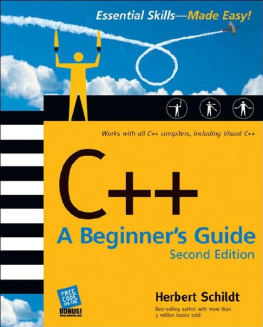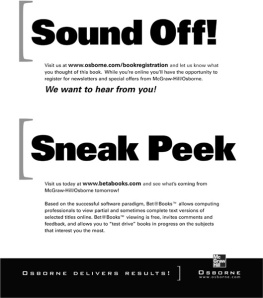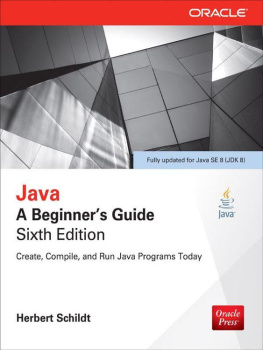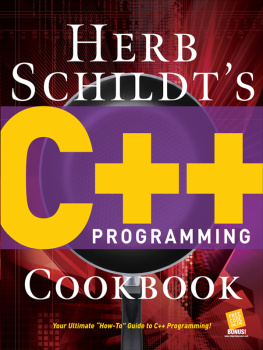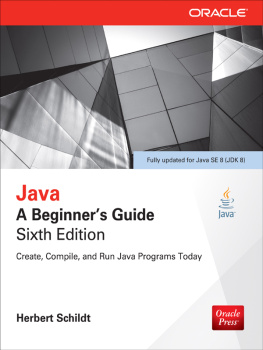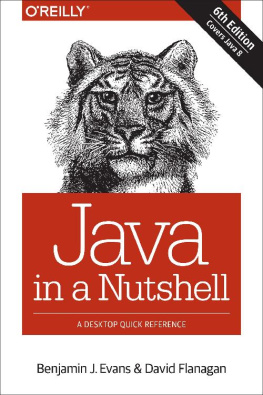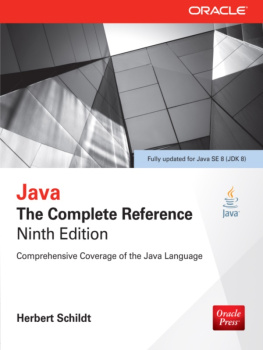Herbert Schildt - Java: A Beginner’s Guide, 8th Edition
Here you can read online Herbert Schildt - Java: A Beginner’s Guide, 8th Edition full text of the book (entire story) in english for free. Download pdf and epub, get meaning, cover and reviews about this ebook. year: 2019, publisher: McGraw-Hill Education, genre: Computer. Description of the work, (preface) as well as reviews are available. Best literature library LitArk.com created for fans of good reading and offers a wide selection of genres:
Romance novel
Science fiction
Adventure
Detective
Science
History
Home and family
Prose
Art
Politics
Computer
Non-fiction
Religion
Business
Children
Humor
Choose a favorite category and find really read worthwhile books. Enjoy immersion in the world of imagination, feel the emotions of the characters or learn something new for yourself, make an fascinating discovery.

- Book:Java: A Beginner’s Guide, 8th Edition
- Author:
- Publisher:McGraw-Hill Education
- Genre:
- Year:2019
- Rating:3 / 5
- Favourites:Add to favourites
- Your mark:
- 60
- 1
- 2
- 3
- 4
- 5
Java: A Beginner’s Guide, 8th Edition: summary, description and annotation
We offer to read an annotation, description, summary or preface (depends on what the author of the book "Java: A Beginner’s Guide, 8th Edition" wrote himself). If you haven't found the necessary information about the book — write in the comments, we will try to find it.
Java: A Beginner’s Guide, 8th Edition — read online for free the complete book (whole text) full work
Below is the text of the book, divided by pages. System saving the place of the last page read, allows you to conveniently read the book "Java: A Beginner’s Guide, 8th Edition" online for free, without having to search again every time where you left off. Put a bookmark, and you can go to the page where you finished reading at any time.
Font size:
Interval:
Bookmark:
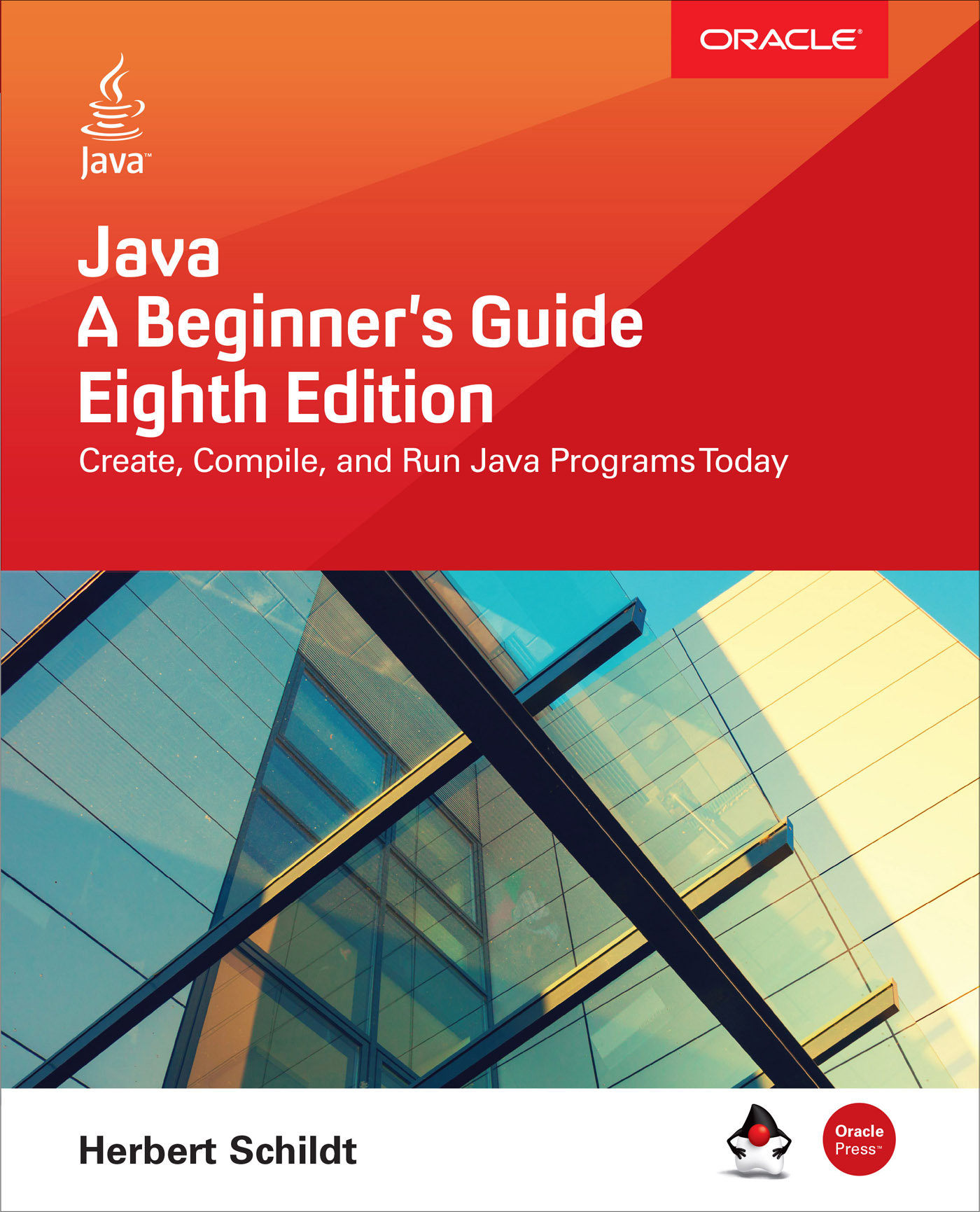
About the Author
Best-selling author Herbert Schildt has written extensively about programming for over three decades and is a leading authority on the Java language. His books have sold millions of copies worldwide and have been translated into all major foreign languages. He is the author of numerous books on Java, including Java: The Complete Reference, Herb Schildts Java Programming Cookbook, Introducing JavaFX 8 Programming, and Swing: A Beginners Guide. He has also written extensively about C, C++, and C#. Although interested in all facets of computing, his primary focus is computer languages. Schildt holds both graduate and undergraduate degrees from the University of Illinois. His website is www.HerbSchildt.com.
About the Technical Editor
Dr. Danny Coward has worked on all editions of the Java platform. He led the definition of Java Servlets into the first version of the Java EE platform and beyond, web services into the Java ME platform, and the strategy and planning for Java SE 7. He founded JavaFX technology and, most recently, designed the largest addition to the Java EE 7 standard, the Java WebSocket API. From coding in Java, to designing APIs with industry experts, to serving for several years as an executive to the Java Community Process, he has a uniquely broad perspective into multiple aspects of Java technology. In addition, he is the author of two books on Java programming: Java WebSocket Programming and Java EE: The Big Picture. Dr. Coward holds a bachelors, masters, and doctorate in mathematics from the University of Oxford.

Copyright 2019 by McGraw-Hill Education (Publisher). All rights reserved. Except as permitted under the United States Copyright Act of 1976, no part of this publication may be reproduced or distributed in any form or by any means, or stored in a database or retrieval system, without the prior written permission of the publisher, with the exception that the program listings may be entered, stored, and executed in a computer system, but they may not be reproduced for publication.
ISBN: 978-1-26-044022-5
MHID: 1-26-044022-2
The material in this eBook also appears in the print version of this title: ISBN: 978-1-26-044021-8, MHID: 1-26-044021-4.
eBook conversion by codeMantra
Version 1.0
All trademarks are trademarks of their respective owners. Rather than put a trademark symbol after every occurrence of a trademarked name, we use names in an editorial fashion only, and to the benefit of the trademark owner, with no intention of infringement of the trademark. Where such designations appear in this book, they have been printed with initial caps.
McGraw-Hill Education eBooks are available at special quantity discounts to use as premiums and sales promotions or for use in corporate training programs. To contact a representative, please visit the Contact Us page at www.mhprofessional.com.
Oracle and Java are registered trademarks of Oracle Corporation and/or its affiliates. All other trademarks are the property of their respective owners, and McGraw-Hill Education makes no claim of ownership by the mention of products that contain these marks.
Screen displays of copyrighted Oracle software programs have been reproduced herein with the permission of Oracle Corporation and/or its affiliates.
Information has been obtained by Publisher from sources believed to be reliable. However, because of the possibility of human or mechanical error by our sources, Publisher, or others, Publisher does not guarantee to the accuracy, adequacy, or completeness of any information included in this work and is not responsible for any errors or omissions or the results obtained from the use of such information.
Oracle Corporation does not make any representations or warranties as to the accuracy, adequacy, or completeness of any information contained in this Work, and is not responsible for any errors or omissions.
TERMS OF USE
This is a copyrighted work and McGraw-Hill Education and its licensors reserve all rights in and to the work. Use of this work is subject to these terms. Except as permitted under the Copyright Act of 1976 and the right to store and retrieve one copy of the work, you may not decompile, disassemble, reverse engineer, reproduce, modify, create derivative works based upon, transmit, distribute, disseminate, sell, publish or sublicense the work or any part of it without McGraw-Hill Educations prior consent. You may use the work for your own noncommercial and personal use; any other use of the work is strictly prohibited. Your right to use the work may be terminated if you fail to comply with these terms.
THE WORK IS PROVIDED AS IS. McGRAW-HILL EDUCATION AND ITS LICENSORS MAKE NO GUARANTEES OR WARRANTIES AS TO THE ACCURACY, ADEQUACY OR COMPLETENESS OF OR RESULTS TO BE OBTAINED FROM USING THE WORK, INCLUDING ANY INFORMATION THAT CAN BE ACCESSED THROUGH THE WORK VIA HYPERLINK OR OTHERWISE, AND EXPRESSLY DISCLAIM ANY WARRANTY, EXPRESS OR IMPLIED, INCLUDING BUT NOT LIMITED TO IMPLIED WARRANTIES OF MERCHANTABILITY OR FITNESS FOR A PARTICULAR PURPOSE. McGraw-Hill Education and its licensors do not warrant or guarantee that the functions contained in the work will meet your requirements or that its operation will be uninterrupted or error free. Neither McGraw-Hill Education nor its licensors shall be liable to you or anyone else for any inaccuracy, error or omission, regardless of cause, in the work or for any damages resulting therefrom. McGraw-Hill Education has no responsibility for the content of any information accessed through the work. Under no circumstances shall McGraw-Hill Education and/or its licensors be liable for any indirect, incidental, special, punitive, consequential or similar damages that result from the use of or inability to use the work, even if any of them has been advised of the possibility of such damages. This limitation of liability shall apply to any claim or cause whatsoever whether such claim or cause arises in contract, tort or otherwise.
T he purpose of this book is to teach you the fundamentals of Java programming. It uses a step-by-step approach complete with numerous examples, self tests, and projects. It assumes no previous programming experience. The book starts with the basics, such as how to compile and run a Java program. It then discusses the keywords, features, and constructs that form the core of the Java language. Youll also find coverage of some of Javas most advanced features, including multithreaded programming, generics, lambda expressions, and modules. An introduction to the fundamentals of Swing concludes the book. By the time you finish, you will have a firm grasp of the essentials of Java programming.
It is important to state at the outset that this book is just a starting point. Java is more than just the elements that define the language. Java also includes extensive libraries and tools that aid in the development of programs. To be a top-notch Java programmer implies mastery of these areas, too. After completing this book, you will have the knowledge to pursue any and all other aspects of Java.
Only a few languages have fundamentally reshaped the very essence of programming. In this elite group, one stands out because its impact was both rapid and widespread. This language is, of course, Java. It is not an overstatement to say that the original release of Java 1.0 in 1995 by Sun Microsystems, Inc., caused a revolution in programming. This revolution radically transformed the Web into a highly interactive environment. In the process, Java set a new standard in computer language design.
Font size:
Interval:
Bookmark:
Similar books «Java: A Beginner’s Guide, 8th Edition»
Look at similar books to Java: A Beginner’s Guide, 8th Edition. We have selected literature similar in name and meaning in the hope of providing readers with more options to find new, interesting, not yet read works.
Discussion, reviews of the book Java: A Beginner’s Guide, 8th Edition and just readers' own opinions. Leave your comments, write what you think about the work, its meaning or the main characters. Specify what exactly you liked and what you didn't like, and why you think so.

